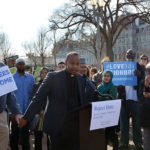President Joe Biden signed into law Dec. 13 a measure mandating federal protection for same-sex marriage and interracial marriage.
The Respect for Marriage Act repeals the 1996 Defense of Marriage Act, which defined marriage as the union of a man and woman. It also grants federal recognition to interracial marriage.
The law does not require states to legalize same-sex marriage, but it mandates states to recognize such unions if they take place in a jurisdiction where they are legal.
It provides legal protection for same-sex marriage even if the Supreme Court at some point overturns the landmark Obergefell v. Hodge ruling, which granted same-sex couples the right to marry.
 The U.S. House of Representatives voted 258-169 on Dec. 8 to give final approval to the amended Respect for Marriage Act. A few days earlier, the Senate approved a version of the bill amended to include religious liberty protections.
The U.S. House of Representatives voted 258-169 on Dec. 8 to give final approval to the amended Respect for Marriage Act. A few days earlier, the Senate approved a version of the bill amended to include religious liberty protections.
The amended version of the Respect for Marriage Act includes language saying nothing in the bill “shall be construed to diminish or abrogate a religious liberty or conscience protection” available under the U.S. Constitution.
The amended bill—which passed with bipartisan support—states: “Diverse beliefs about the role of gender in marriage are held by reasonable and sincere people based on decent and honorable religious or philosophical premises. Therefore, Congress affirms that such people and their diverse beliefs are due proper respect.”
It specifically says churches and other nonprofit organizations will not be required to provide same-sex marriage ceremonies. It also states it does not “require or authorize” federal recognition of polygamous marriage.
The bill grants private individuals, as well as the U.S. attorney general, authority to bring civil action in federal court against anyone who violates its protections.
Sign up for our weekly edition and get all our headlines in your inbox on Thursdays
Faith-based groups that supported the amendments that added religious liberty protections to the Respect for Marriage Act included the National Association of Evangelicals, the Church of Jesus Christ of Latter-Day Saints, the Council for Christian Colleges and Universities and the Seventh-day Adventist Church.
Some religious groups voice objections
The Southern Baptist Convention Ethics & Religious Liberty Commission opposed the Respect for Marriage Act, and its president, Brent Leatherwood, expressed disappointment the bill had become law.
“Since our work opposing this bill began in July, the ERLC has remained consistently clear: Marriage is an institution that cannot be defined by the government. God has intentionally established it as a life-long, covenantal union between one man and one woman for the purpose of human flourishing,” Leatherwood told Baptist Press.
“Unfortunately, now that this act has become law, more people will be led astray and deceived by the false promises of the sexual revolution. We are prepared to meet these challenges and continue our advocacy to ensure that people of faith are able to hold to their most fundamental beliefs about marriage and sexuality in the public square.”
Ryan Bangert, senior vice president of the Alliance Defending Freedom, asserted the Respect for Marriage Act represented “blatant hostility against people of faith.”
“The First Amendment protects every American, including the many millions of us who hold decent and honorable beliefs about marriage. The president and Congress have intentionally threatened free speech and religious liberty with enactment of the ‘Respect for Marriage Act,’ continuing a pattern of blatant hostility against people of faith,” Bangert said.
“Sadly, the president chose virtue-signaling over protecting millions of Americans, churches and faith-based organizations that spoke out for months about the undeniable harms of this unnecessary bill. This law is a solution in search of a problem that provides no additional protection or benefits to same-sex couples. However, it does undermine the constitutional freedoms that belong to each of us.”
In addition to the ERLC and the Alliance Defending Freedom, other groups that remained opposed to the amended Respect for Marriage Act included the U.S. Conference of Catholic Bishops, the Religious Freedom Institute and the Family Research Council.
In a recent “Respecting Religion” podcast, Holly Hollman, general counsel and associate executive director of the Baptist Joint Committee for Religious Liberty, rejected the premise that expanding the rights of some necessarily endangers the rights of others.
“What we see in this debate is that there is still a powerful temptation to equate rights for others, for LGBTQ people, as an attack on religious liberty, and that’s disheartening,” Hollman said.
“The rights recognized by marriage equality should not be perceived as taking away religious beliefs or the way religious marriages are performed or recognized in any religious tradition, religious congregation or other religious entities.”
















We seek to connect God’s story and God’s people around the world. To learn more about God’s story, click here.
Send comments and feedback to Eric Black, our editor. For comments to be published, please specify “letter to the editor.” Maximum length for publication is 300 words.